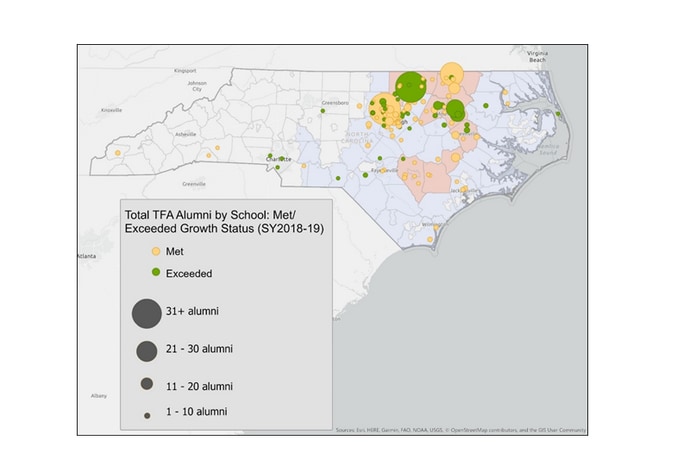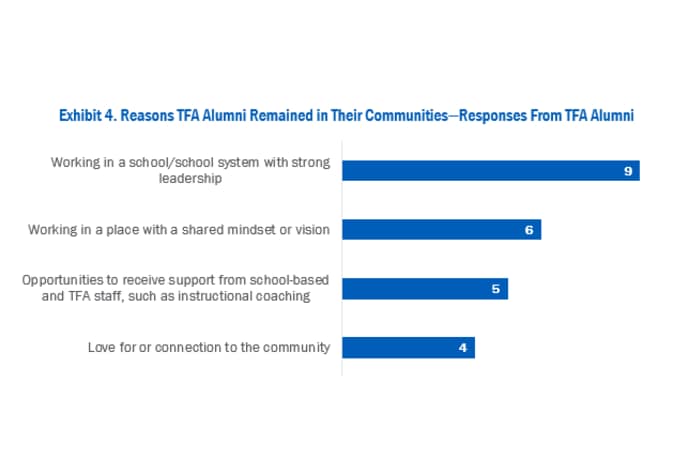Why They Stay: Keeping Strong Veteran Teachers in Rural Regions

Rural students need and deserve high quality teachers. But teacher recruitment and retention in rural areas are difficult, especially if you’re looking for teacher leaders who are going to work with students to produce life-changing results.
Rural school districts face a unique set of challenges when recruiting teachers to their communities, including fewer local amenities to attract teachers and social isolation compared to big cities. These school districts also face higher stakes—research shows that rural students are less likely to graduate from high school and enroll in college than suburban students.
The Eastern North Carolina (ENC) region of Teach For America is addressing these challenges to improve teacher recruitment and retention in their region. According to Andrew Lakis, the executive director of the region, “We know we need our alumni—they do great work and we want more of them in rural ENC. Recently, we have seen a huge increase in our alumni population, especially alumni that are becoming school leaders. We noticed also that there were a few sites where those leaders were more densely populated. That made us wonder why these leaders chose to stay and what has been their impact on students and our community. We wanted to engage an external research team to figure out the story behind these changes in a systematic, rigorous way.”
What can we learn from ENC alumni about why they choose to stay in their rural region and how they think rural schools can retain more teachers? What can we learn from these same alumni about the important work they do each day to help their students achieve success? The ENC region enlisted the help of the American Institutes for Research in the fall of 2019 to answer these questions and more.
Check out the full report, “Making an Impact: Teach For America Alumni in Eastern North Carolina Rural Schools,” or read on to learn more about the key findings.
“I love the concentration of TFA alum[ni] here. I’ve stayed because of the relationships with a lot of them … but, really, what’s kept me in the area is the people that I get to work with every day, and the community that we get to serve, and I’m just grateful that I ended up here.”
a TFA alum describing why he chose to stay in the Eastern North Carolina region
Methodology
AIR first set out by finding schools in the ENC region that had high concentrations of TFA alumni and were demonstrating high levels of student achievement. Using Geographic Information Systems (GIS), a computer tool that helps map and analyze data, the researchers overlaid TFA alumni data on top of North Carolina student achievement data to find the schools.
Next they solicited input from TFA staff at the ENC region to narrow down the list to three specific school sites: Edgecombe County School District, KIPP Gaston and KIPP Halifax, and Henderson Collegiate. They then identified 38 TFA alumni at these sites to interview and conducted in-person qualitative interviews in the fall of 2019. The researchers gathered insights from these alumni about their experiences in ENC, presented below:

Why Alumni Stay
TFA alumni shared the reasons they stayed in ENC schools after their two-year commitment ended. These reasons included positive school culture, connections to colleagues and community, and strong, supportive district and school leadership. 20 of 38 alumni interviewed were placed in the ENC region for their corps commitment and decided to stay after completing their two-year requirement. As one alumnus explained, “One of the hardest decisions to make as a corps member is whether or not to leave kids and a community you’ve become close to.”
15 of these 20 TFA alumni who completed their corps commitment in ENC stayed at their placement schools. Another 13 alumni said that other TFA alumni recruited them to their current schools in ENC through informal connections that helped them to learn about job opportunities. One connection that stood out was the Northeast Leadership Academy at North Carolina State University, where alumni had the opportunity to connect with each other from roles across the state. Many expressed feeling drawn to innovative instructional approaches within their schools and districts when choosing to work there. For these many reasons, many alumni remain in the ENC region.

How Alumni Impact Student Success
AIR found that TFA alumni are well aware of challenges their students face, including deep-rooted inequality and a lack of school-based resources, and they help address these challenges. These systems of inequality, rooted in racism and deep poverty, often lead to poor health outcomes, food insecurity, lack of housing, and student trauma. Deep understanding of the issues facing their communities and a strong commitment to their region help TFA alumni to break these cycles.
17 of 38 respondents shared that a large TFA presence in their schools helped to create a shared mission and vision for students. The common mission and vision included high expectations for all students (e.g., 100 percent of students will be ready for college when they graduate), the fostering of positive relationships with students, promotion of a sense of community among staff, and the use of restorative justice and culturally competent practices. Six respondents added that TFA’s high expectations and shared commitment to rigorous instruction were instrumental in their teacher effectiveness.
“[Our school leadership has] been instrumental in creating a culture that has high accountability, a ton of inspiration, opportunities to grow. They’re really good at pushing you to become a better version of yourself. I think being in a work environment where I feel I’m getting to live out my values and what I believe in, on a daily basis, but also where I’m pushed to be the best version of myself every day, influences me to stay.”
a TFA alum describing TFA’s impact on their school culture.
Takeaways for Other Rural Districts
Rural school districts’ needs vary greatly. Nevertheless, this study has some important findings that other regions can learn from. These are three key ways that rural communities can recruit and retain their high quality teachers and ultimately impact student success:
First, relationships matter. TFA alumni were most likely to name the relationships they have with other alumni, teachers, and/or their school leadership were the reasons they stayed. Next, having a common vision is important. TFA ENC alumni attributed their success in part to a shared mission and vision for their students. Finally, districts must provide strong leadership and opportunities for professional learning. Good teachers are more effective at their jobs when they feel supported by their school leadership and have opportunities to grow.


